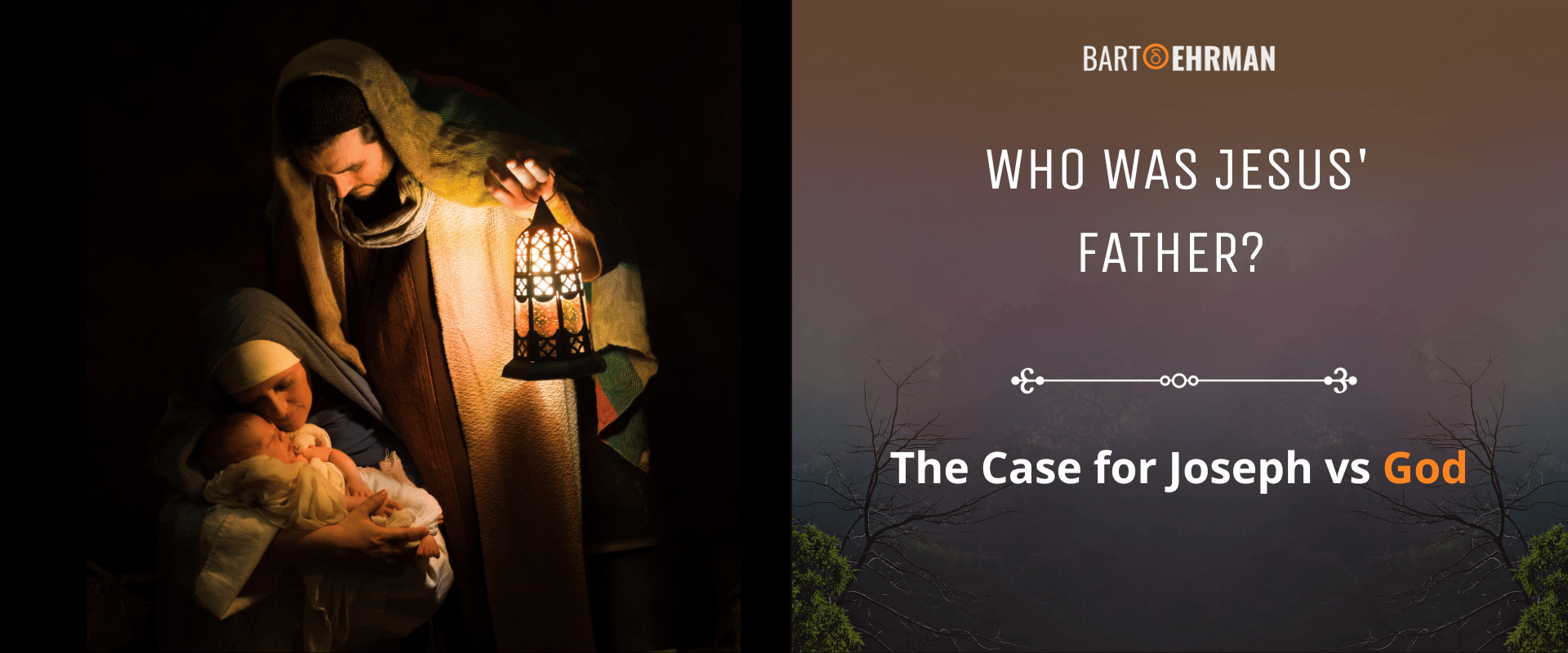Who Was Jesus' Father? The Case for Joseph vs God

Written by Marko Marina, Ph.D.
Author | Historian
Author | Historian | BE Contributor
Verified! See our guidelines
Verified! See our editorial guidelines
Date written: December 27th, 2023
Disclaimer: The views and opinions expressed in this article belong to the author and do not necessarily match my own. - Dr. Bart D. Ehrman
"Who was Jesus' father?" This question has intrigued theologians, historians, and scholars for centuries, forming a pivotal inquiry at the heart of Christian narrative and historical analysis. Our exploration begins with this enigmatic query, one that opens the door to a fascinating intersection of theological belief and scholarly discourse.
The answer to "Who was Jesus' father?" is not just a matter of historical curiosity, but a profound reflection on the very foundations of Christian theology and historical understanding.
In this article, we delve into two distinct perspectives on this age-old question. On one hand, there is the theological approach, primarily rooted in the infancy narratives of Matthew and Luke, where divine intervention is key, and God is presented as the father of Jesus, with Joseph as his adoptive guardian.
On the other hand, we have the scholarly perspective, grounded in historical analysis and evidentiary study, which refrains from asserting supernatural causes. This dual examination not only highlights the contrasting methodologies in understanding Jesus' paternity but also offers a deeper insight into how studying religious history can be challenging to both historians and theologians.
If you're intrigued to explore further, consider delving into Dr. Bart D. Ehrman's insightful lessons titled "Jesus: The Actual Son of Joseph" As a distinguished scholar in early Christian studies, Dr. Ehrman meticulously dissects the narratives in Matthew and Luke, shedding light on the nuanced aspects of Joseph's potential role as Jesus' earthly father.
His expertise brings new depth to understanding these texts, highlighting both the famous virgin birth story and the more subtle biblical references to Jesus’ father’s name.

Who Was Jesus’ Father? A Theological Answer
In the heart of Christian theology, the infancy narratives of Matthew and Luke offer a profound and mystical insight into the question of Jesus' paternity. These narratives, rich in symbolic and theological significance, present a divine explanation: God is the father of Jesus.
In the Gospel of Matthew, the birth of Jesus is a fulfillment of prophecy, enveloped in miraculous events and divine interventions. Matthew’s overall approach, as Dale C. Allison Jr. and William D. Davies have demonstrated, is to present Jesus as the fulfillment of the Old Testament prophecy within the Moses typology.
The angel's message to Joseph in a dream, revealing that Mary's conception is by the Holy Spirit, establishes a clear theological stance: Jesus is not merely a child born of human parents, but the incarnation of divine will and purpose.
The Gospel of Luke, while harmonious with Matthew in the divine conception, provides a more detailed account of the circumstances surrounding Jesus' birth. Here, the emphasis is also on the Holy Spirit’s role in Jesus’ conception, underscoring the belief in Jesus as the Son of God.
Even though Luke agrees with Matthew’s idea of Jesus’ divine conception, he explains the act differently. M. David Litwa has shown how Luke deliberately avoided direct sexual language and emphasized the spirit that overshadowed Mary.
By doing that, the author of Luke’s Gospel utilized Platonic discourse that, for instance, Plutarch shared as well.
However, both gospels also significantly acknowledge Joseph's role. Joseph is portrayed not as the biological father, but as the adoptive guardian, a righteous man who accepts the responsibility of caring for Jesus and Mary.
This portrayal of Joseph is vital in the theological narrative, as it not only highlights his faith and obedience to God's will but also reinforces the idea of Jesus as a divine entity, set apart from ordinary human lineage, yet firmly rooted in a family structure.
Did You Know?
Saint Joseph is celebrated in various traditions worldwide, particularly within the Roman Catholic Church. His feast day is celebrated on March 19th, honoring his role as Jesus' guardian.
This day is significant as it reflects on his dual role as both a foster father and a protector. Additionally, there is a separate celebration on May 1st, known as the Feast of St. Joseph the Worker, focusing on his profession as a carpenter and worker, thereby highlighting the dignity of labor.
Despite the subtle differences, both Matthew’s and Luke’s overall conclusion is that Jesus is more than an ordinary human.
Who was Jesus’ father in the Gospels?
For Matthew and Luke, the answer is straightforward: Jesus’ father is God and the divine birth in Matthew and Luke only emphasizes his divine origin. Luke is particularly eager to show Jesus as the Son of God - a title that would have been familiar among the pagan converts.
Who Was Jesus’ Father? A Scholarly Look at the Miracle Claims
In the realm of historical analysis, the use of supernatural elements as explanations for past events presents a methodological challenge. Historians, in their quest to reconstruct the past, rely on evidence and probability, steering clear of supernatural claims due to their inherently unverifiable nature.
This approach is crucial in maintaining scholarly rigor and objectivity. For instance, attributing the outcome of significant historical events, like the Allies' victory in the Second World War, to divine intervention would lead us into a quagmire of subjective and untestable assertions. Such an approach wouldn’t only undermine the discipline's credibility but also blur the lines between historical analysis and theological belief.
The principle of methodological naturalism, as shown by Dr. Bart Ehrman, underpins historical inquiry. This principle posits that explanations for past events should be grounded in natural causes and phenomena, as these are accessible to empirical investigation and analysis.
Miracles, by their very definition, are extraordinary and least probable occurrences, making them incompatible with the historian's pursuit of the most probable explanations.
The reliance on miracles or divine interventions as explanatory tools in historical research would not only compromise the integrity of the analysis but also set a precedent for accepting similar claims across various religious and cultural traditions without critical scrutiny.
Take, for instance, the example of Joseph Cupertino (17th century) - an Italian Conventual Franciscan friar who is honored in the Roman Catholic tradition as a Christian mystic and saint. It was said that he could levitate and had intense visions that left him gaping. During his beatification, hundreds of people who knew him personally were interviewed, and they all claimed to have witnessed him levitate.
As Dale C. Allison Jr. notes, if this were evidence for anything else non-supernatural, it would be a slam-dunk case. When multiple people who knew this individual at different times and in different places, including political leaders, a pope, common people, and others, all agree on something, it should be considered a fact.
However, since it involves something supernatural, such as levitation, it becomes difficult to explain. And historians can't, based on their scholarly work, claim that John Cupertino could levitate.
There are examples from other religious traditions as well. To paraphrase Allison's remark, once the nose of the camel of miracles is inside the tent of New Testament scholarship, who knows what else may enter? Vespasianu’s miracle claims? The miraculous claims of Jewish religious leaders? We would be opening Pandora’s box!
Earthly Father of Jesus: Was Jesus Illegitimate?
Beyond the traditional theological explanation of Jesus' birth, alternative theories have emerged over time trying to "find" an earthly father of Jesus. Celsus, a 2nd-century critic of Christianity, was one of the first to suggest that Jesus was the illegitimate son of Mary and a Roman soldier named Panthera.
This theory was likely proposed by Celsus to counter the Christian claim of Jesus' divine conception, offering a more earthly and scandalous explanation for his birth. Celsus' account reflects an early skeptical view, aiming to undermine the miraculous narrative of the Gospels. Some scholars, such as Daniel Marguerat, are inclined to accept his claim.
However, James F. McGrath's analysis challenges this theory. McGrath argues that the social interactions of Jesus, as depicted in the Gospels, don't align with the societal treatment expected for someone of illegitimate birth in that culture.
The lack of stigma or direct questioning of Jesus' legitimacy in his adult life, particularly in a society where such a background would have been notable, undermines the illegitimacy hypothesis. McGrath's work suggests that the historical and social evidence doesn't support the claim that Jesus was an illegitimate child.
So, who was Jesus’ father? What does the scholarly analysis of the New Testament yield? Are there any answers about the earthly father of Jesus? As it turns out, there are! Stay tuned as we embark on the prevailing hypothesis among critical scholars!
Joseph: the Father of Jesus (A Scholarly Look at the Evidence)
In the scholarly quest to answer "Who was Jesus' father?", a critical examination of the earliest Christian texts reveals compelling insights. Our earliest sources, the letters of Paul and the Gospel of Mark are notably silent on the notion of Jesus' divine birth.
In Galatians 4:4, Paul simply states that Jesus was born of a woman (ἐκ γυναικός), with no mention of a virgin birth, suggesting he may have been unaware of this concept.
It’s indicative that Paul doesn’t use the article before the noun “woman” suggesting that he doesn’t specify anything about her or Jesus’ birth. Commenting on this verse, Ronald Fung notes that “it’s perhaps unlikely that Paul does have the virginal conception in view”.
Similarly, the Gospel of Mark, considered the earliest Gospel, doesn't refer to a divine birth narrative. In fact, Mark 3:20-21, where Jesus' family seeks to restrain him, seemingly under the impression that he is out of his mind, raises questions. If his family knew of a divine birth, their surprise and concern at his miraculous deeds would seem incongruous.
Moreover, the infancy narratives are historically problematic, containing several discrepancies and improbabilities. To learn more about that, check out our earlier article!
Additionally, who would even be the source of the story of Jesus' birth? After carefully analyzing all the possibilities (e.g. Mary, Joseph, and James, the brother of the Lord), Raymond Brown concludes: "We have no real knowledge that any or all of the infancy material came from a tradition for which there was a corroborating witness."
On the positive side, the New Testament Gospels contain multiple references to Jesus as "the son of Joseph," reinforcing the idea of a natural parentage. These mentions, found in the Gospels of John, Luke, and Matthew, suggest a common understanding among early Christians of Jesus' familial connection to Joseph. Check out some of those instances:

Given these observations, many historical Jesus scholars lean towards the hypothesis that Joseph was indeed Jesus' father. The lack of early Christian writings supporting a virgin birth narrative, combined with the explicit references to Joseph as the biological father of Jesus, paints a picture of a more ordinary, familial context for Jesus' upbringing.
And who was Joseph’s father? The only mention of Joseph’s father in the New Testament Gospels comes from Matthew’s and Luke’s genealogies. However, they are at odds with each other thus emphasizing once again the contradictory element of the gospel narratives.
In Matthew 1:16, it’s written: "Jacob begot Joseph, the husband of Mary, of whom was born Jesus who is called Christ." This implies that Jacob was Joseph's father. However, in Luke 3:23, a different lineage is presented: "Jesus, when he began his ministry, was about thirty years of age, being the son (as was supposed) of Joseph, the son of Heli."
It's challenging to derive substantial historical information from these genealogies, given their inconsistencies and the appearance of Luke's version as a later addition. This suggests that Luke's genealogy might not have been part of the original Gospel, indicating a subsequent interpolation.
Regarding Jesus’ father, Helen Bond concludes: “The probability is that Jesus was the son of Joseph and was born in Nazareth, the small Galilean village where he grew up. Such a conclusion is generally held by most historical Jesus critics, including all those detailed in Chapter 1 (except N. T. Wright)."
Summing up Conclusions: Who Was Jesus’ Father?
In conclusion, as both a believer and a historian, it's clear that while historical analysis points towards Joseph as the biological father of Jesus, this doesn’t necessitate abandoning faith in the miraculous. History, bound by methodological naturalism, seeks only naturalistic explanations for past events, including the question "Who was Jesus' father?".
Writing about the issue of Jesus’ Messianic identity, Heinrich E. Schilebeeckx draws the conclusion that can be utilized for our purposes as well: “No reconstruction of historical data about Jesus can show that he was the Christ. As I said before, calling Jesus "the Christ" is not the result of a scholarly discovery.”
